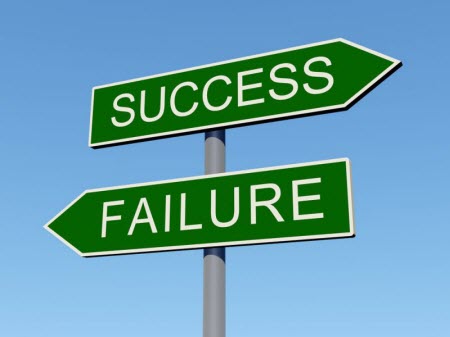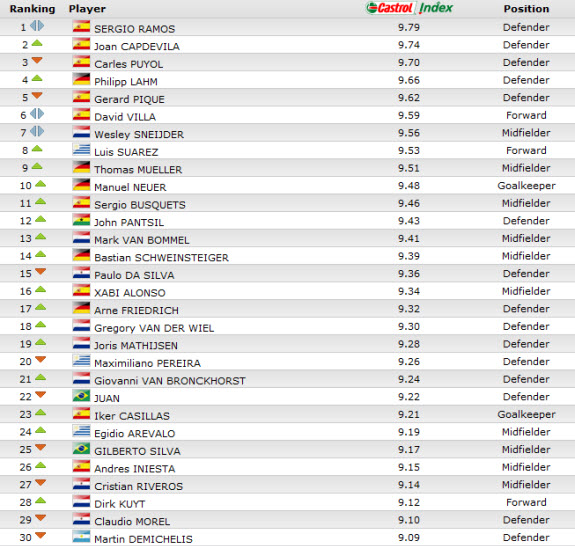World Cup 2010 Blog: “Soundoff: Was World Cup 2010 a Success or Failure?” plus 4 more |  |
- Soundoff: Was World Cup 2010 a Success or Failure?
- The Dutch Get A Parade Too – A Canal Parade.
- Don’t Stop Watching Soccer Just Because the World Cup is Over
- Was Sergio Ramos Really the Best Player at World Cup 2010?
- World Cup Teams Ranked #1 to #32
| Soundoff: Was World Cup 2010 a Success or Failure? Posted: 13 Jul 2010 02:30 PM PDT
There are many many ways to measure the success or failure of World Cup 2010: We could judge it on the quality of the football played and the excitement of the games. Was it enjoyable? We could judge it financially: How much did FIFA and/or South Africa make/lose? What were the TV ratings like? How many Twitter followers did Sepp Blatter get? We could judge the tournament in terms of organization and infrastructure: Did all the matches take place without any logistical hiccups, could all the fans get to the games? We could judge the tournament based on how it affected the image of South Africa as a country or soccer as a sport. We could take any and all of these factors into account, and many more. I don’t want to define the terms of success or failure for the World Cup, but I do want to know what you think about the tournament now it’s over. So based on any criteria you want to use: Do you think World Cup 2010 in South Africa was a success or a failure? And, as always, why? |
| The Dutch Get A Parade Too – A Canal Parade. Posted: 13 Jul 2010 12:54 PM PDT
I have to think a canal ride is far better than a double-decker bus with a sweaty Carles Puyol, not to mention able to do the casual boating thing with a lightweight jacket tied casually around the waist as a few Dutchmen were doing (well played). Pretty good July afternoon, you’d think. Although having the Jules Rimet trophy riding shotgun surely trumps everything. But there are certain sporting events in which final placement is not the end-all or be-all; the World Cup is most certainly one. Video after the jump. |
| Don’t Stop Watching Soccer Just Because the World Cup is Over Posted: 13 Jul 2010 11:07 AM PDT
If you watched the World Cup but didn’t really care for what you saw, then move along. This post is not for you. If you watched the World Cup and thought you might want to get into this soccer thing year round (as opposed to quadrennially) then read on. Because we in the football loving world have some advice for you… The good news is that the football season is much much more than one month of football every four years. It basically never ends. International tournament football will be back next summer with Copa America 2011 (like a World Cup for South American teams) and before that the European teams will begin the process of qualifying for Euro 2012 (like a World Cup for Euro teams). But aside from all that, there’s the bread and butter of club football. Here’s a half decent analogy, using basketball: The World Cup was like the Olympic basketball tournament, where every nation sends their best players. Club football is like the NBA. Except instead of just one all-powerful league filled with all-star players, there are several. Good news is that we have a whole other website – a sister site to World Cup Blog – that’s focused on club football. It’s called The Offside, and you can find it by clicking that link. On the front page you’ll find informative posts like this list of kickoff dates for every European league, as well as plenty of news, humour and opinion from the wide wide wide (that’s three wides, so you know it’s wide) world of club football. As well as the front page, we also have 250+ team specific blogs for clubs large and small. So if you want to read about Man Utd, Barcelona, Real Madrid, Bayern Munich, Internazionale and many many more, then it’s all there. Most of these teams can be found on television (or somewhere on the internet). Choosing which of these leagues to watch and which of these teams to support is a personal decision. Most agree that the big five leagues are (in alphabetical order) England, France, Germany, Italy and Spain. So if you have family ties or a cultural affinity with any of those places, then maybe that’s a way to start. But choosing a team to support from amongst those leagues is another matter. Maybe a topic for another post. If you like the flashy tournament angle of the World Cup, then you’ll be please to hear about the UEFA Champions League, in which the very best teams from around Europe compete against each other for a big trophy and big money. Good news is that this tournament happens every single year. As well as watching the big leagues and reading The Offside, you may want to get out of the house and find a team see live in the flesh. If you’re in the US then find your nearest MLS team, or a team from the lower divisions of US Soccer. Football’s great on the TV, and discussing it on blogs is a lot of fun. But nothing beats seeing it happen right in front of you. |
| Was Sergio Ramos Really the Best Player at World Cup 2010? Posted: 13 Jul 2010 08:59 AM PDT
I’m not 100% sure how the Castrol rankings work, but the introduction on the FIFA sub-site promises that: “Using objective analysis and highly advanced technology, every pass, tackle and move on the field is measured and assessed to see if it has a positive or negative impact on a team’s ability to score or concede a goal.” I watched the World Cup, and Ramos seemed his usual self to me. Dangerous going forward, hair flowing behind him, while being ever so slightly suspect at the back (though admittedly with the occasional impressive slide tackle thrown in). My guess is that Spain’s strong defensive record (just two goals conceded in seven games) gave all the Spanish defenders a strong statistical foundation, and the forward forays of both Ramos and Capdevila earned them a bonanza of extra points for completed passes, crosses and so on. Here’s the Castrol Index top 30:
Here’s some food for thought. The above rankings are based on statistical analysis (flawed or otherwise) and show the overwhelming importance of defensive players. Yet the Golden Ball nominations featured precisely zero defenders. Which I think proves once again the old adage that attackers sell tickets while defenders win trophies. - If you’re a big Sergio Ramos fan, you can follow him post World Cup at Real Madrid Offside. |
| World Cup Teams Ranked #1 to #32 Posted: 13 Jul 2010 07:21 AM PDT
No surprise that Spain and Netherlands are #1 and #2 respectively, with semifinalists making the top four and quarterfinalists making the top eight. The English media seem shocked that England were ranked 13th, their lowest every placing at a World Cup. But after finishing second in what should have been an easy group, and then conceding four goals in the round of 16 game, I’d say England are lucky to be 13th and not 16th. Final rankings below:
9 Japan, 10 Chile, 11 Portugal, 12 United States, 13 England, 14 Mexico, 15 South Korea, 16 Slovakia 17 Ivory Coast, 18 Slovenia, 19 Switzerland, 20 South Africa, 21 Australia, 22 New Zealand, 23 Serbia, 24 Denmark 25 Greece, 26 Italy, 27 Nigeria, 28 Algeria, 29 France, 30 Honduras, 31 Cameroon, 32 North Korea Credit to New Zealand who entered the tournament as potential last place finishers but went home unbeaten (with three draws) and in 22nd place. New Zealand officially had a better World Cup than both of the 2006 finalists as Italy finished 26th and France 30th. Cameroon had the disappointment of their tournament confirmed with 31st place, while North Korea’s three straight defeats (including that 7-0 disaster against Portugal) sees them finish as the worst team from World Cup 2010. FIFA’s new world rankings (featuring every team in the world, not just World Cup teams) will be released tomorrow. No prizes for guessing which team will be top. |
| You are subscribed to email updates from World Cup Soccer - South Africa 2010 To stop receiving these emails, you may unsubscribe now. | Email delivery powered by Google |
| Google Inc., 20 West Kinzie, Chicago IL USA 60610 | |



 This post is addressed to everyone who didn’t consider themselves full on football fans before June 11th 2010, but tuned in to watch the World Cup because it’s one of those unmissable global events. I’m not exclusively talking to Americans here. I could be talking to Australians or New Zealanders, or anyone really. But if I’m honest I am mostly talking to Americans. Because that’s where I live.
This post is addressed to everyone who didn’t consider themselves full on football fans before June 11th 2010, but tuned in to watch the World Cup because it’s one of those unmissable global events. I’m not exclusively talking to Americans here. I could be talking to Australians or New Zealanders, or anyone really. But if I’m honest I am mostly talking to Americans. Because that’s where I live. The Castrol Index Rankings people say that he was, with Spain right back Ramos finishing top of the overall rankings table at the end of the World Cup, with a rating of 9.79. Fellow Spain defenders Joan Capdevila and Carles Puyol finished second and third respectively.
The Castrol Index Rankings people say that he was, with Spain right back Ramos finishing top of the overall rankings table at the end of the World Cup, with a rating of 9.79. Fellow Spain defenders Joan Capdevila and Carles Puyol finished second and third respectively.
 FIFA has released its post-World Cup rankings, with every team that played in South Africa numbered #1 to #32.
FIFA has released its post-World Cup rankings, with every team that played in South Africa numbered #1 to #32. 

